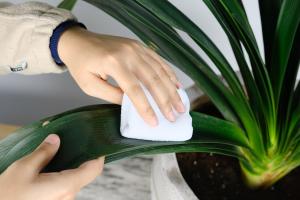Why Do Plants Stop Taking Water?
Plants are essential to our environment and survival. They are responsible for producing the oxygen we breathe, and they help regulate the Earth's climate. Water is an essential component for plant growth and survival, but sometimes plants stop taking water. This article will explore the reasons why plants stop taking water and what can be done to help them.
Environmental Factors
Environmental factors such as temperature, humidity, and wind can affect plants and their ability to take up water. High temperatures can cause plants to wilt and lose water rapidly. Low temperatures can also affect plants, causing their roots to become inactive and unable to absorb water. Dry or low humidity can cause water loss through evaporation, and strong winds can increase water loss through transpiration.
Soil Conditions
The condition of the soil can also affect how well plants take up water. Soil that is compacted, waterlogged, or has poor drainage can reduce the amount of water that plants can absorb. If soil conditions are not ideal, it can cause root damage and prevent plants from getting the water they need.
Root Problems
Root problems are a common reason why plants stop taking water. Root rot, a disease caused by fungus or bacteria, can cause roots to die and prevent plants from absorbing water. Root damage from animals or insects can also cause plants to stop taking water. Additionally, if the roots are too small or poorly developed, the plant may not be able to absorb enough water.
Water Quality
The quality of the water can affect how well plants take up water. Water that is high in salts or minerals can be harmful to plants and make it difficult for them to absorb water. Water that is contaminated with chemicals or pollutants can also be detrimental to plant growth and survival.
Plant Health
The health of the plant itself can be a factor in its ability to take up water. If a plant is stressed or diseased, it may not be able to absorb or transport water effectively. Over-fertilization or the use of the wrong type of fertilizer can also cause plant stress and affect its ability to take up water.
Solutions
If your plants have stopped taking up water, there are several steps you can take to help them. First, check the environmental conditions and make adjustments as necessary. Provide shade or protection from strong winds, and water plants early in the morning or late in the evening when temperatures are cooler. Improve soil conditions by adding organic matter, aerating, or providing better drainage. If root problems are detected, prune damaged roots and apply a fungicide or insecticide as needed. Use high-quality water that is free of contaminants and salts, and ensure that plants are receiving the right amount of fertilizer at the appropriate times.
Overall, understanding the reasons why plants stop taking water is important for maintaining healthy and vibrant plants. By monitoring environmental conditions, soil quality, root health, water quality, and plant health, we can help our plants thrive and contribute to a healthier environment.

 how many times do yo...
how many times do yo... how many planted tre...
how many planted tre... how many pine trees ...
how many pine trees ... how many pecan trees...
how many pecan trees... how many plants comp...
how many plants comp... how many plants can ...
how many plants can ... how many plants and ...
how many plants and ... how many pepper plan...
how many pepper plan...





























